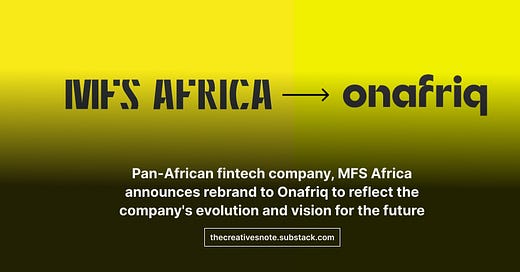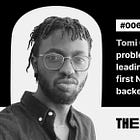Pan-African fintech company, MFS Africa announces rebrand to Onafriq to reflect the company's evolution and vision for the future
The decision to rebrand comes after significant growth and several acquisitions, including the recent acquisition of GTP, which expanded the company's reach to the US market.
On November 1, Pan-African FinTech company, MFS Africa announced a new identity—name and logo—to reflect the company's evolution and vision for the future.
The company which launched in 2009 set out to provide a solution to the infrastructure limitations posed within Africa. Over the years, it has enabled connectivity between mobile money systems and money transfer organisations, including banks, insurance companies, and other financial institutions.
In 2021, it first refreshed and updated its visual identity to a cleaner and sharper logo and a pop of optimistic yellow. “Our new branding reflects this sharper sense of purpose. Our vision remains the same. The only thing that has changed is the scale of that vision,” Dare Okoudjou, founder and CEO of MFS Africa stated in his announcement in 2021.
Two years after a major visual identity refresh, the company has announced another major change to its identity. In its latest announcement, it revealed a new name and logo.
In a personal statement by the founder on the decision to rebrand, he revealed how he came up with the name—MFS Africa—and the need for the change.
Picking a company’s name is a funny business. For those of you who read Shoe Dog, you would remember the long hours that Phil Knight and his teams spent to finally land on the name Nike. In my case, when I was incorporating the company in 2009, choosing the name took me a grand total of 10 minutes. I had just left MTN, and I knew their name stood for the uninspiring “Mobile Telephone Network”. Yet they went on to become the continental giant and very inspiring company they are today. So, I didn’t think the name would matter that much, and I was entirely practical about it: I wanted the scope to broadly be about mobile-based financial services and the focus to be Africa. That’s how we came to be known as MFS Africa.
The Need for a New Name
In the announcement, the company says the decision to rebrand comes after significant growth and several acquisitions, including the recent acquisition of GTP, which expanded the company's reach to the US market. “The trademark MFS actually belongs to another company in the US, and our ability to use it outside of Africa was becoming difficult,” Dare Okoudjou, founder and CEO revealed. “With this new name, we can bring everybody together under one brand and identity.”
Read Also: Opay reveals new logo and declares the dawn of a new era
The founder also noted that “The name MFS Africa, just like an old jacket, was getting a little tight for us as we’ve grown. We've expanded beyond just mobile financial services, becoming a true omni-channel platform across the continent and beyond. As we embark on this next phase of our journey, we wanted a name that reflects our aspiration of wiring up the whole continent into one network of networks with pathways from and to every African and every African business.”
Onafriq: Origin and Meaning
According to the reveal, the inspiration behind the new name, Onafriq, stems from the fusion of several powerful words: "Ona", the Yoruba word for pathways and the French word for Africa, Afrique - plus a nod to IQ, signalling MFS Africa’s commitment to being the smartest game in African fintech.
It also noted that Onafriq calls to mind the idea of One Africa, an interconnected borderless continent where access unlocks greater potential.
“This time, when we finally announced the new name, it felt right. It does reflect our destiny: to become the One payment network of networks that truly brings about the One Africa that Africans, African businesses, and the whole world have been calling for,” Okoudjou revealed in a personal statement.
“From the get-go, my goal was to build a payment infrastructure that touches every corner of Africa and that lasts for over 100 years. My hope is that we get to do that and that we get to make borders truly matter less,” he added.











